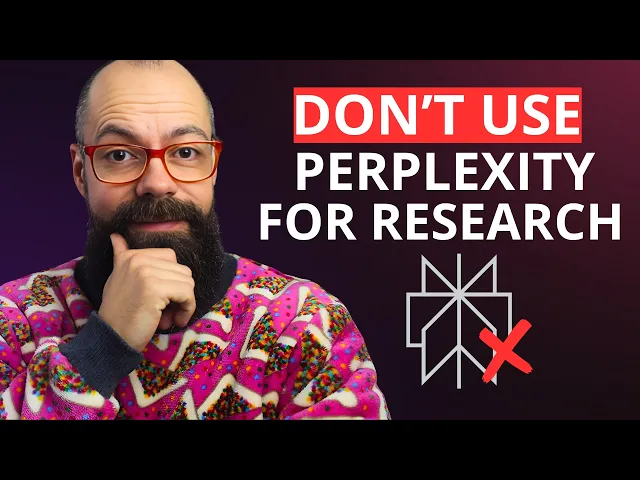Stop Using Perplexity. Consensus AI Just Made Research 10x Faster.

Consensus AI might replace Perplexity for research
In a digital landscape where information overload is the norm, finding reliable research tools has become increasingly crucial for business professionals. A recent video exploration compares two rising stars in the AI-powered research space: Perplexity and Consensus AI. The presenter makes a compelling case that Consensus AI might be poised to revolutionize how we conduct research, potentially making the process dramatically more efficient than competitor tools.
Key Points
- Consensus AI differentiates itself by focusing specifically on scientific research papers, providing academic-quality information rather than general web searches
- Unlike Perplexity, Consensus directly links to and extracts from peer-reviewed papers, offering higher reliability for professional research
- The platform's unique "Research Assistant" feature allows users to directly ask questions about specific papers, summarizing complex academic content instantly
The Game-Changing Element: Evidence-Based Responses
What makes Consensus AI particularly valuable is its evidence-first approach to information retrieval. While tools like Perplexity offer conversational search capabilities, Consensus builds its responses directly from scientific literature, significantly reducing the likelihood of hallucinations or factual errors that plague many AI systems. This represents a fundamental shift in how AI-assisted research functions – prioritizing verifiable sources over model-generated content.
This matters tremendously in today's business environment where misinformation can lead to costly strategic errors. As industries from healthcare to finance increasingly rely on data-driven decision making, having a tool that can rapidly extract insights from reliable academic sources provides a competitive advantage. The distinction between search engines that find information versus research tools that verify information has never been more important.
Beyond the Video: Practical Applications
For business users, Consensus AI offers particular value in fields requiring deep technical knowledge. Consider pharmaceutical executives needing to understand emerging treatment protocols, or sustainability officers researching environmental impact methodologies. Traditional approaches might involve hiring specialized consultants or dedicating weeks to literature reviews. Consensus potentially compresses this timeline dramatically.
Take the example of a medical device manufacturer I consulted with last year. Their product development team needed to validate claims about a new material's biocompatibility. Using conventional search methods, their research phase stretched across six weeks. A tool like Consensus could have identified the relevant studies and summarized findings in hours rather than weeks, potentially
Recent Videos
How To Earn MONEY With Images (No Bullsh*t)
Smart earnings from your image collection In today's digital economy, passive income streams have become increasingly accessible to creators with various skill sets. A recent YouTube video cuts through the hype to explore legitimate ways photographers, designers, and even casual smartphone users can monetize their image collections. The strategies outlined don't rely on unrealistic promises or complicated schemes—instead, they focus on established marketplaces with proven revenue potential for image creators. Key Points Stock photography platforms like Shutterstock, Adobe Stock, and Getty Images remain viable income sources when you understand their specific requirements and optimize your submissions accordingly. Specialized marketplaces focusing...
Oct 3, 2025New SHAPE SHIFTING AI Robot Is Freaking People Out
Liquid robots will change everything In the quiet labs of Carnegie Mellon University, scientists have created something that feels plucked from science fiction—a magnetic slime robot that can transform between liquid and solid states, slipping through tight spaces before reassembling on the other side. This technology, showcased in a recent YouTube video, represents a significant leap beyond traditional robotics into a realm where machines mimic not just animal movements, but their fundamental physical properties. While the internet might be buzzing with dystopian concerns about "shape-shifting terminators," the reality offers far more promising applications that could revolutionize medicine, rescue operations, and...
Oct 3, 2025How To Do Homeless AI Tiktok Trend (Tiktok Homeless AI Tutorial)
AI homeless trend raises ethical concerns In an era where social media trends evolve faster than we can comprehend them, TikTok's "homeless AI" trend has sparked both creative engagement and serious ethical questions. The trend, which involves using AI to transform ordinary photos into images depicting homelessness, has rapidly gained traction across the platform, with creators eagerly jumping on board to showcase their digital transformations. While the technical process is relatively straightforward, the implications of digitally "becoming homeless" for entertainment deserve careful consideration. The video tutorial provides a step-by-step guide on creating these AI-generated images, explaining how users can transform...
